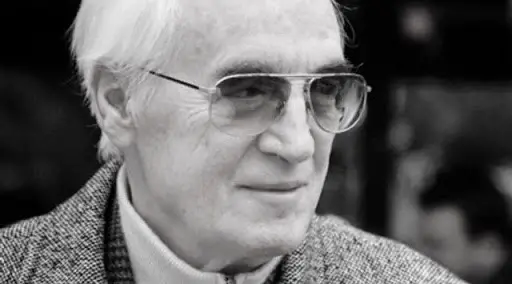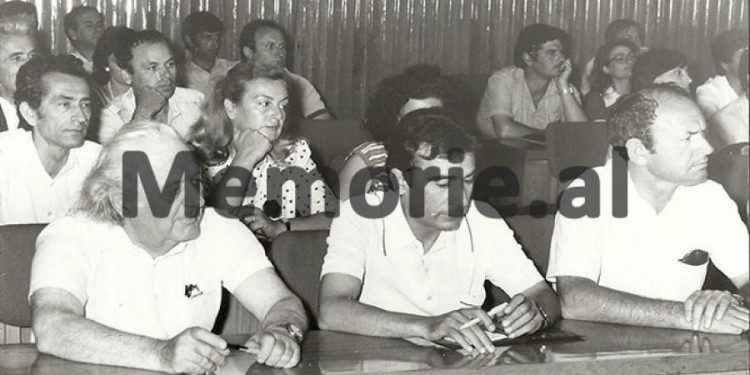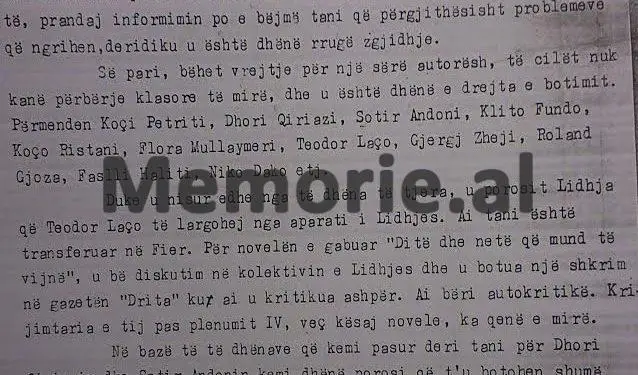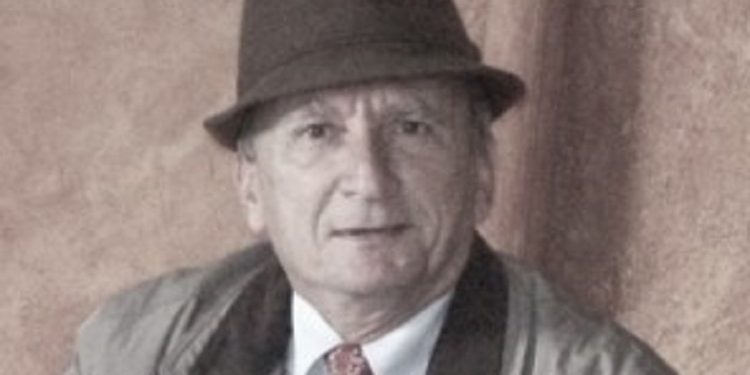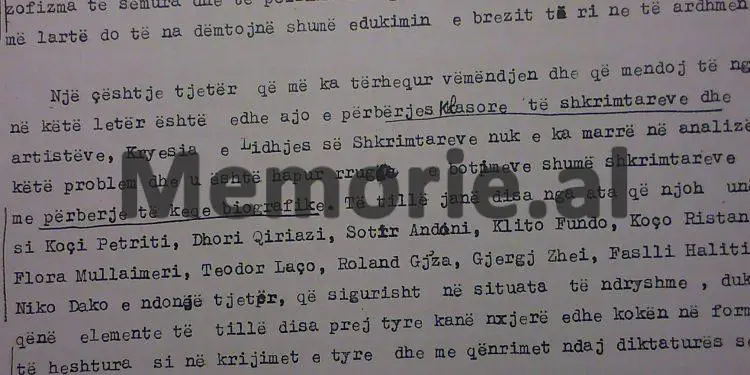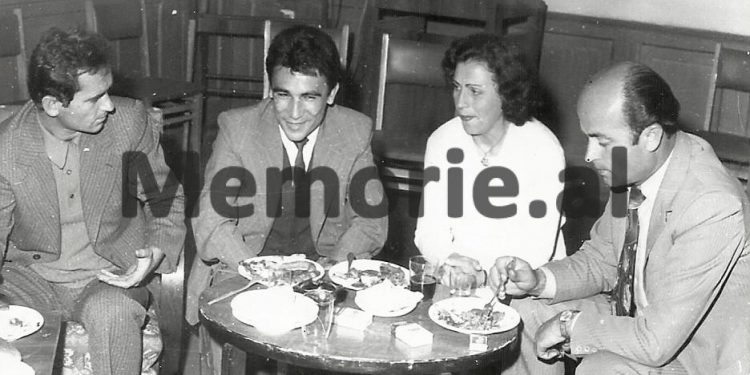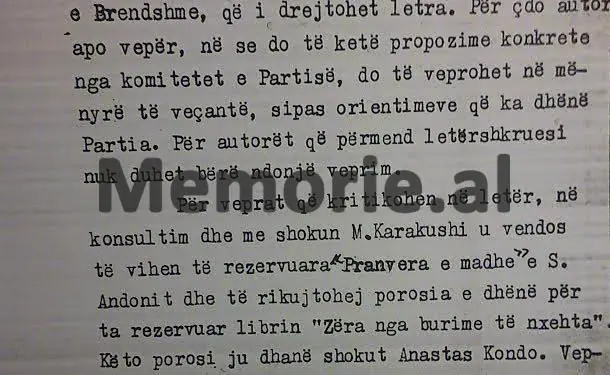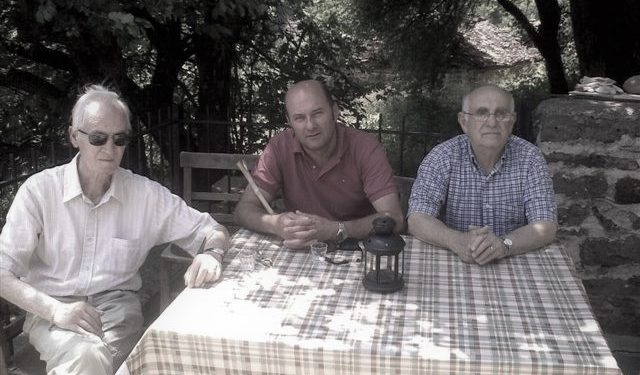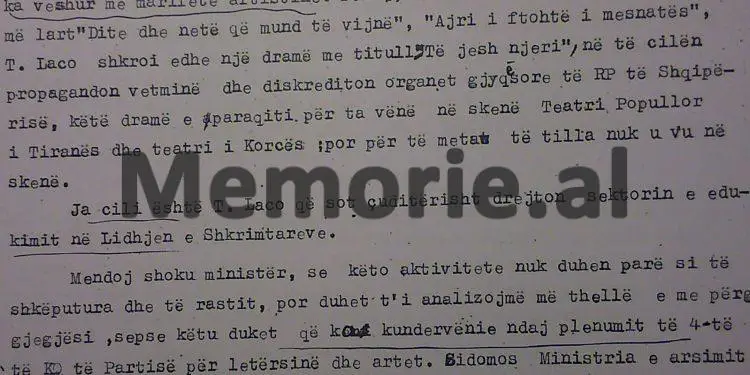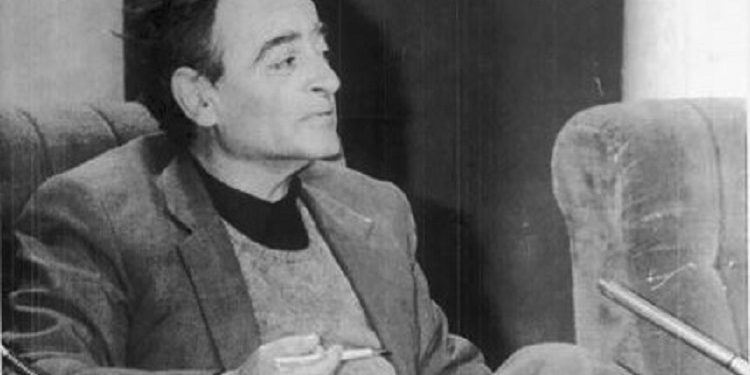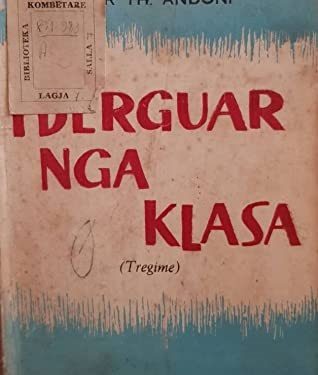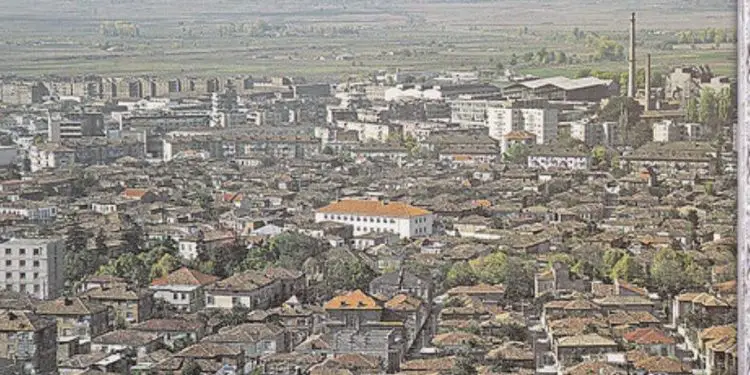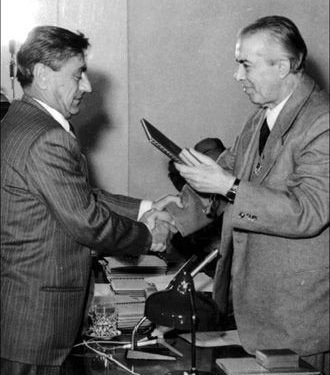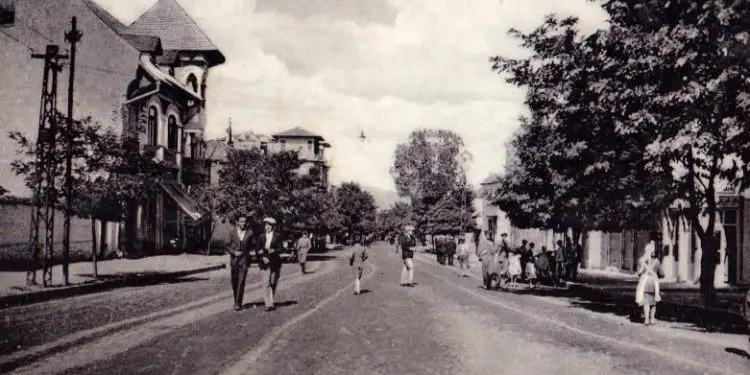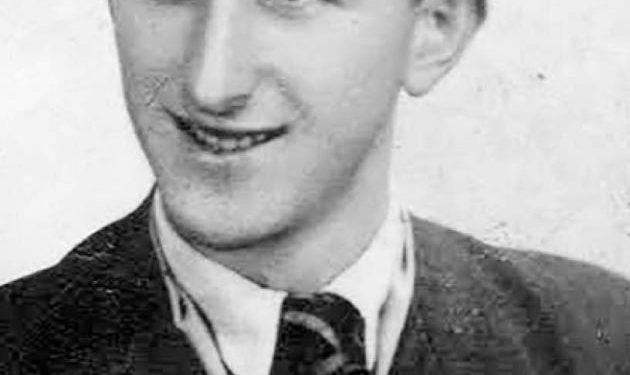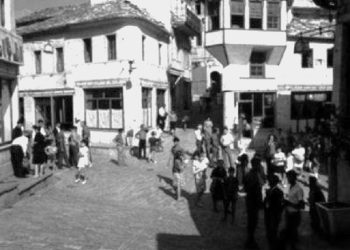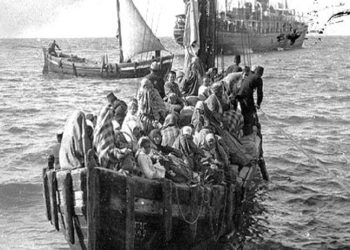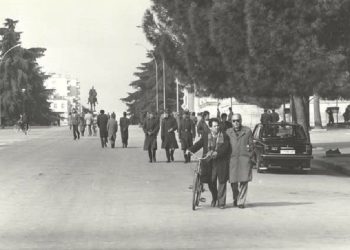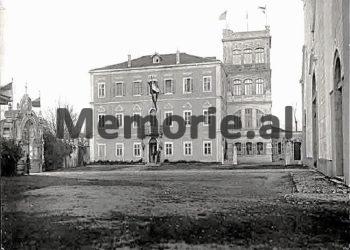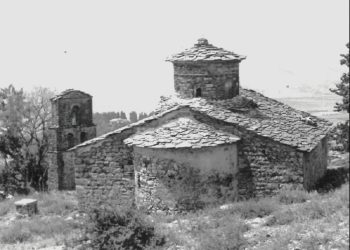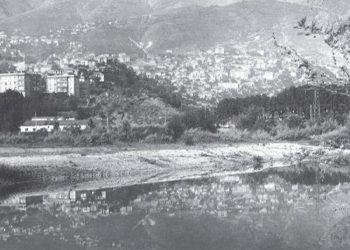Dashnor Kaloçi
Memorie.al publishes some unknown archival documents with the logo “Top secret” issued by the Central State Archive in Tirana, (the fund of the former Central Committee of the ALP), and that of the Ministry of Internal Affairs, where there is a voluminous dossier with a correspondence with letters, reports, information, reports, notes, instructions, etc., which belong to the end of 1974 and the beginning of 1975, which opens with a letter of the writer Hamza K., addressed to the Minister of Works Interior of that time, Kadri Hazbiu, where he denounces some of his colleagues, names of the most famous of Albanian literature, such as: Sabri Godo, Teodor Laço, Sotir Andoni, Dhori Qirjazi, Faslli Haliti, Roland Gjoza, Koçi Petriti, Frederik Rreshpja, Milianov Kallupi, Flora Mullaymeri, Klito Fundo, Koço Ristani, Niko Dako, Petraq Zoto, etc. The full letter of the military writer, Hamza K., from the city of Korça, to Minister Hazbiu, where in addition to analyzing some of the works and books that had been published to seven of his colleagues up to that time, by the Publishing House “Naim Frashëri” in Tirana, as well as the silence of the literary bodies “Drita” and Nëntori “of the League of Writers and Artists of Albania, he has raised many other problems, such as their careers and biographical aspects, even taking long and up to detailed details about them, which at that time alarmed the senior leadership of the ALP in Tirana, the State Security and all other relevant structures that depended on the problems that were raised in that letter, etc. .
The great ‘storm’ that arose against the writers and artists of Albania and all other employees of art and culture, after the speech of Enver Hoxha, initially held at the meeting of the Presidium of the People’s Assembly of Albania on January 9, 1973 , (just a few days after the end of the 11th National Song Festival on Radio-Television) and then at the extended meeting of the communists of the basic organization of the party of the apparatus of the Central Committee of the ALP which was held on the 15th and March 16 of that year, as it would go on long. Among other things, this is clear from the documents, which are taken from a voluminous file with the initials “Top secret”, where there is a long correspondence with letters, information, reports, reports, instructions, notes, etc., which belong to the month of November 1974 and continue long, until the end of 1975.
One of those writers that Hamza K., has denounced and has long dealt with his biographical side, was also the writer Teodor Laço, whom he knew very well, as he also had a fellow citizen from Korça. Although Teodor Laço, achieved a lot in his long career as a writer, screenwriter, playwright, prose writer before the ’90s, and director of the Kinostudio “Shqipëria e Re”, MP, ambassador, diplomat and minister, etc., after 90s, if we refer to the documents we are publishing, it seems that time has not provided, so much peace.
He even had to face many surprises that could very well change the course of his life. And not only him, but also his family and relatives. While he was leaving his hometown, Korça, and had come to Tirana, working full of passion and desire, at the Writers’ League, suddenly, at the end of 1974, a letter written by a “writing colleague” addressed to the minister Interior Minister, Kadri Hazbiu, with very serious accusations, made Teodori be transferred from Tirana and sent to the district of Fier, where he worked for ten years.
It did not end there, because as we will see from the documents in question, the letter that the “writing colleague” wrote about Teodor, alarmed the senior leadership of the ALP, which set in motion all its structures, even the Security of State, to discover and hit not only Teodor Laçon, but also some other writers such as Sabri Godo, Sotir Andoni, Faslli Haliti, Roland Gjoza, Moikom Zeqo, Koçi Petriti, Flora Mullaymeri, etc., who were mentioned and accused in that letter. And it was not long before measures were taken against them, where at first some of the books that Teodor Laço and his colleagues had published up to that time were removed from circulation…!
The letter of the writer, Hamza K., addressed to the Minister of Internal Affairs, Kadri Hazbiu, where he denounces some of his colleagues
Comrade Kadri Hazbiu, Minister of Internal Affairs
Dear Comrade Minister
I am sending you this letter for some of those problems of literature and art that have bothered me and according to the message I gave to you, when you were in the assets of the Korça Corps Party, I am listing them as follows:
Without denying the good work and successes that have been achieved in literature and arts in our country, after the speeches of comrade Enver Hoxha last year and after the IV Plenum of the Central Committee of the ALP, and without denying the fight that has been done against manifestations of liberalism in these very important spheres of the cultural ideological front; I think that some negative tendencies and performances have not been hit to the end yet and some volumes of stories, poems, novels and dramas are not being properly criticized in our literary press (in the newspaper “Drita” and the magazine “Nëntori”); or particular poems, stories, and poems, some of which for marked anti-socialist errors, were struck by the Central Committee of the Party and later by readers.
For example: Sabri Godos’s story “Campaign”, which is not summarized in the book of stories “Voices from Hot Springs”, “The Great Spring”, and “Notes Written at Night” by Sotir, have been officially criticized. Andoni, the book “Cold Midnight Air”, by Teodor Laço (these two are brother-in-law and had a close friendship with Todi Lubonja). Poetry books “Mosaic” by Roland Gjoza (this is a declassified element and has been deprived of the right to publish), the book of poetry by Moikom Zeqo.
Also, Faslli Haliti and Flora Mullaymeri, for bad family composition and for displaying immorality and liberalism in their attitude and writings after the IV Plenum of the Central Committee of the Party, for both administrative measures were taken by our bodies. But the bad thing is that the books I mentioned above continue to be read, because no appropriate measures were taken by the Ministry of Education and Culture to remove them from circulation.
Also, instead of banning the publication of books with revisionist content, they are still published by the Publishing House “Naim Frashëri”. And such a thing happens exactly after the decisions of the IV Plenum of K.Q. of the Party. Such books have been published “In this city”, “A mother came”, with poems by Frederik Rreshpja and Milianov Kallupi, or some books with poems by Kosovar poets such as those of Enver Gjergjek and Ali Podrimja, etc. Most of the poems in these books are with dark, pacifist and formalist ideas they are basically debauched both in their content and in their artistic form. Even in the newspaper “Drita” and in the magazine “Nëntori”, poems continue to be published depraved from poetic, prosaic forms and not based on the national sole. Let’s take e.g. a concrete case:
In the magazine “Nëntori”, No. 3, 1974, was published the novel by Teodor Laço, “Days and nights that can come”. In this novel, the author presents a part of our occupied southern territory (at the present time), within three days and three nights, by a Greek division (as it is known a division has 13 to 14 thousand soldiers, here comes the absurdity and falsity); without any resistance on the part of our armed forces. Even from the beginning of the war, the author presents that our army is dispersed in partisan detachments and enters the caves of the mountains.
This novel reflects the hostile views of Beqir Balluku, who denied the first-degree war on the organized front. The novel also exposes the tactical variants that we use in training, but that we keep in complete conspiracy. Also, this novel spreads fear and panic to those who read it, because in that way events and situations are reflected. I propose to ask the author, with whom military specialists he has consulted about the materials of the novel, while to take a stand against him, because this is not the first time he writes like this.
Art readers who translate from foreign languages read massively to us, and especially from the youth. I have noticed that some such translated books focus on sexuality, loneliness, idle life, suicides, detective adventures, the western world and imperialism. Such books are: “Large families”, “Death on a boat”, “Three people in a boat”, “Yellow dog”.
Giving to the new generation books that are permeated by the negative phenomena of debauchery and degeneration; they harm our young people and in their ranks we will be infected. Special facts show that uncontrolled content art books are being translated in large numbers and that young people are massively withdrawing these books, underestimating our original publications. And what happens next, special young people imitate in their lives the actions of negative book characters. I will illustrate this with just one example: although there are such cases.
A young officer, named Dashamir Turhani, an effective of our wards, committed suicide, tending to read only translated lib art books that reflected loneliness; and suicides from lacking proper ideological formation, which with the first difficulty encountered in personal life, (besides the other negative performances it reflected), deepened in reading books dealing with the act of suicide; while on the day he was going to kill himself he had read the novel “Participant in the murder”, in this novel he had underlined whole paragraphs that pushed him towards the criminal act.
I think that if translated artistic books continue to be published, or originals that do not have revolutionary content and that are filled with sick philosophies and described by complex ideas, as I touched on above, I will harm the education of the new generation in the future.
Another issue that has caught my attention and that I intend to raise in this paper is that of the class composition of writers and artists. The presidency of the Writers ‘and Artists’ League has analyzed this problem and opened the way for many writers with poor biographical composition.
Such are some of those I know like: Koçi Petriti, Dhori Qirjazi, Sotir Andoni, Klito Fundo, Koço Ristani, Flora Mullaymeri, Teodor Laço, Roland Gjoza, Gjergj Zheji, Faslli Haliti, Niko Dako, and some others, who of course in various situations, being such elements, some of them have put their heads in silent forms both in their creations and in their attitudes towards the dictatorship of the proletariat…!
“Sotir Andoni, sentenced to prison, publishes books with yellow thoughts, churches, mosques, monasteries, imams and priests” Let’s take and analyze only two of those we touched above: Sotir Andoni and Teodor Laçon. Sotir Andoni in 1948 tried to escape to Greece, but was caught at the border and convicted by the people’s court. As he came out of prison to rehabilitate himself he began to write stories, while in 1960, the way was opened for his publication and he published several books through friends he has in the publishing bodies, and in the Presidency of the Writers’ League.
What matters is that all the books and writings of Sotir Andoni constitute doubts and the phenomena in them have not been treated from the position of socialist realism. His books deal with themes from the 1920s and 1940s and are filled with churches, mosques and monasteries, with yellow thoughts, with merchants, landowners, priests, imams and scavengers. Reflecting these in books as reasonable, charitable to our people, in the novel “The Great Spring” the German Nazis are presented as kind and reasonable people to the people and not as oppressors and bloodthirsty.
Let me dwell specifically on some of Sotir Andoni’s books. In the storybook “The Knocks of Horses at Midnight” there are stories that darken our socialist reality and humiliate the dignity of our people. In the novel “The Great Spring”, the Germans are presented as kind people to our people, as if they had not come to Albania as occupiers, but to cross to Greece or elsewhere, in this novel our National Liberation War is humiliated.
In the novel “Notes written at night”, the National Liberation War is reflected as a war of committees that is not led by the party, but by “cultured” intellectuals, in the novel “The little one can grow up” that a Greek non-commissioned officer during the Italian war Greek, “educates” our youth and children and instilled in the blood “ideas of liberation”. According to the author, ideas are imported and are not a source of inner strength of a people.
In the story “Gigi Gas Violation”, this element offends the figure of the veteran of the National Liberation War and the secretary of the Party Committee, portraying them as dalkauks and people of allishverish. Now, recently, he wrote a drama entitled “Autumn Avalanche”, the director of the Professional Theater of Korça, Petraq Zoto, since he has a villager, staged it at the Theater of Korça by a director with an attitude of bad political (his brother was convicted of espionage activities), for the preparation of this drama and the salaries of actors were spent 25 thousand new lekë, when it came to appearing to the public, he was rightly stopped, because in this The drama was full of bitterness for the National Liberation War and according to it, our fight was not for political power, but simply for economic demands, coexisting with all the traitors of the country after the liberation.
Worse still, according to government laws, when an artistic piece does not appear, its approvers must compensate the state coffers, let alone other measures that were not taken, but were passed in silence.
Apart from the creations, Sotir Andoni did not have a good attitude even during the time when Todi Lubonja was the secretary for propaganda. He, having a close friendship with Todi Lubonja, was a supporter of liberal writings and the declassed element, for the services he had rendered to Todi Lubonja, the latter took him to Radio-Television as an editor and was expelled from Radio-Television, after the dismissal of Todi Lubonja from all functions. We are giving another example.
In the magazine “Ylli”, No. 1 Year 1973, Sotir Andoni has published an interview, where he lowers our socialist education system in terms of learning foreign languages, raising the educational system in the regime of fascism in Albania. In the same interview, this “writer” praises a teacher of that time, Virgjir Ballamaçi, who was a member of the fascist party “Garda di ferra” and after the liberation of the homeland maintained a bad hostile attitude towards the popular power.
Then the question arises, how this man (S. Andoni), who is known for these stains instead of being deprived of the right to publish and take action and take a stand against it, still continues to publish, while our critics and executives of the Writers’ League do not spare good words in his address, saying that “he is a talented writer”? They wrote these in the press of the League, in the newspaper “Drita” and in the magazine “Nëntori”.
Teodor Laço (brother-in-law of Sotir Andoni), his father lived and died in the USA. In the USA, Teodor Laço’s father owned colossal wealth, part of which he sent to children in Albania in dollars. Also, T. Laços and his family continue to receive banknotes from the USA. Even T. Laço, like S. Andoni, had a close family friendship with T. Lubonja, giving the latter costumes and other materials, while T. Lubonja intervened by transferring him to Tirana, to the Presidency of the League of Writers, where he still works today in the education sector of this department.
Teodor Laço, when he went to Tirana, unhesitatingly supported literary creations with liberal performances. In the newspaper “Drita” he wrote an article about a drama by Fadil Paçrami, where he raised to the sky the “great talent” of Fadil Paçrami, as if this Easter was the greatest playwright in Albania and as this drama, recommended by Teodor Laço, written.
The same attitude was held by Teodor Laço towards the anti-socialist poem “The sun and the streams” by Faslli Haliti, with an article he published in the newspaper “Drita”, of course to hide the traces in some cases he criticized, but at the same time he praised Faslli Halitin, as if you had a book of very good poems in print.
The book of poems praising Teodor Laço for revisionist tendencies was not published. Last year, after the speech of Comrade Enver on March 15, when a great fight was being waged against liberal performances in literature, especially in poetry, Teodor Laço published an article in the newspaper “Drita”, praising exactly those creations and those literary young people, whom the party criticized for foreign appearances in their writings.
In 1972, Teodor Laço published a book of stories “Cold Midnight Air”, where our socialist reality is distorted, this writer slanders our reality in this book, wearing countless negative sides, without saying anything positive about socialism, but to discover the downsides of this book is certainly difficult because it has clothed them with artistic tricks.
In addition to the hostile novel I mentioned above, “Days and Nights That May Come”, “Cold Midnight Air”, Teodor Laço wrote a play entitled “Being a Man”, in which he propagates loneliness and discredits our judicial bodies. RP of Albania, presented this drama to be staged at the People’s Theater of Tirana and the Theater of Korça, but for such shortcomings it was not staged.
Here is Teodor Laço, who today strangely leads the education sector in the Writers’ League. I think, Comrade Minister that these activities should not be seen as isolated and occasional, but we should analyze them more deeply and responsibly, because here it seems that there is opposition to the IV Plenum of the Central Committee of the ALP, for literature and artet.
Especially the Ministry of Education and Culture, the League of Writers and Artists, the Publishing House “Naim Frashëri”, should return once again for study and analysis of the words of Comrade Enver last year, and the decisions of the V Plenum of the Central Committee of Party and draw conclusions to take concrete measures in this field, such as literature and arts./ Memorie.al
Korça dt. 14. 11.1974
With revolutionary respect
Party member
Hamza K… ..
The next issue follows




